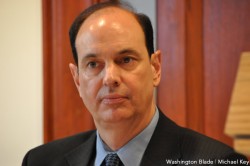National
Sigh of relief as shutdown ends
HIV service providers spared; staffers return to work

Some federal workers are troubled over accusations made by Sarah Palin and others that the U.S. Park Service is being disrespectful to veterans by denying access to monuments in Washington. (Photo by Therealbs2002; courtesy Wikimedia Commons)
UPDATE: The federal government shutdown ended Thursday and thousands of employees returned to work in D.C. and across the country. This story was posted shortly before Congress passed a bill to fund the government and avert a default:
As the federal government’s shutdown entered its third week, LGBT and AIDS advocates expressed alarm that community-based AIDS service providers in D.C. and across the nation could be forced to lay off employees and curtail services if the shutdown and its related funding reductions continued much longer.
Democratic and Republican leaders in the Senate announced a bipartisan agreement on Wednesday calling for raising the debt ceiling and ending the government shutdown. Although political observers thought there were enough votes to approve the agreement in both the Senate and the House, no one was certain whether the GOP-controlled House would pass the compromise bill initiated in the Senate.

Leonard Hirsch (Washington Blade photo by Michael Key)
Leonard Hirsch, president of the LGBT federal workers group Federal GLOBE, said that, like all federal workers, thousands of furloughed LGBT federal employees continued as of Wednesday to struggle without a paycheck.
The shutdown, which closed many but not all federal agencies, left more than 800,000 federal employees furloughed, according to the U.S. Office of Personnel Management. With the federal government being the largest employer in the D.C. metro area, the area is said to have been affected the most by the shutdown.
“Everyone that I know in the federal workforce is very frustrated that they’re not allowed to be getting work done, that things are piling up, that their clients are not being served,” said Hirsch, who has worked at the Smithsonian Institution for 24 years.
Hirsch said he and nearly all the federal workers he knows – LGBT and straight – are especially troubled over accusations by Obama administration critics, including former GOP vice presidential candidate Sarah Palin, that the U.S. Park Service is being disrespectful to veterans and other citizens by denying them access to the World War II Memorial and other monuments in Washington.
“The law is clear,” he said. “If Congress has not appropriated money you cannot work on things and do things. And so we can’t open parks. We can’t open museums and monuments because Congress has not appropriated the money.”
Added Hirsch, “I don’t know a single person at the Park Service who is happy about closing doors, and I know a lot of people at the Park Service…It’s putting the federal worker in this horrible bind to say we can’t do these things and being abused for following Congress’s direction.”

Don Blanchon (Washington Blade file photo by Michael Key)
Don Blanchon, executive director of Whitman-Walker Health, the D.C. area’s largest private agency providing medical and social services to people with HIV and the LGBT community, said Whitman-Walker has “weathered” the federal shutdown so far largely because it accumulated a substantial reserve fund over the past several years.
“By and large, the impact of the shutdown directly on our operations and patient care is minimal,” he told the Blade on Monday. “We’re open. We’re serving patients. And for the foreseeable future we don’t see this shutdown causing us a tremendous amount of difficulty right now,” he said.
But Blanchon noted that Whitman-Walker along with other D.C. community-based health groups serving people with HIV has been hit by D.C.’s inability to pay its Medicaid reimbursements. Under a federal law, D.C. is prohibited from spending its own money obtained through local tax revenue if Congress doesn’t approve the city’s annual budget.
With Congress deadlocked over the federal budget, under which the D.C. budget falls, the city has been unable to spend much of its own funds since the federal shutdown began on Oct. 1 at the start of the new fiscal year. Since D.C.’s budget is intertwined with the federal budget, D.C. has been impacted by the shutdown in a way that no other city or state has, a development that has infuriated D.C. Mayor Vincent Gray.
At an Oct. 11 town hall meeting Gray said the shutdown has forced the city to tap into its reserve funds to keep city agencies open and to continue city services through the end of this week or next, at which time he said the usable portion of the reserve fund would be depleted.
But Gray said the reserve fund wasn’t large enough to enable the city to cover $90 million in Medicaid reimbursement payments to the city’s private clinics and medical providers that take Medicaid patients during the previous week.
Blanchon said the delay in the Medicaid payments resulted in Whitman-Walker not receiving about $70,000 in reimbursements for its Medicaid patients.
While Whitman-Walker’s reserve fund will enable the LGBT health provider to “weather the storm” for the time being, as Blanchon put it, other community-based health providers don’t have such a financial cushion, officials with those groups have said. Some of them have already been forced to lay off employees and curtail services, including HIV-related services, the officials have said.

Ruby Corado (Washington Blade file photo by Michael Key)
“We’re already seeing services cut back for LGBT and Latino community clients,” said Ruby Corado, director of the LGBT community center Casa Ruby. Corado said Casa Ruby, which is funded largely by private donors, wasn’t immediately affected by the shutdown.
Ron Simmons, executive director of Us Helping Us, a D.C.-based HIV service provider that reaches out to black gay men, said his group has also managed to get buy for the past two weeks “without any noticeable impact.”
But Simmons said Us Helping Us won’t be able to operate without possible service interruptions if the federal shutdown continues indefinitely. Although his organization doesn’t have the type of reserve fund that Whitman-Walker has, Simmons said much of the group’s federal funding for the fiscal year has already been appropriated by Congress through various grants. He said the payments through those grants, including one from the U.S. Centers for Disease Control and Prevention, have continued uninterrupted during the shutdown.
Similar to other HIV service providers in D.C. and across the nation, funding from the Ryan White federal AIDS program also had been appropriated by Congress prior to the shutdown, enabling groups receiving Ryan White grants to continue to receive the funds through the rest of the fiscal year, according to Carl Schmid, deputy director of the AIDS Institute, a national HIV/AIDS advocacy organization.

Carl Schmid (Washington Blade file photo by Michael Key)
“Luckily, the grants went out in April,” said Schmid in referring to the Ryan White program, which he said provides millions of dollars to AIDS groups across the country.
But Schmid cautioned that if the federal shutdown were to continue, AIDS service providers would be adversely impacted in a number of ways.
One immediate effect, he said, was federal officials who provide support for the processing of Ryan White grant applications were furloughed as soon as the shutdown began on Oct. 1.
“The new grant applications are due Oct. 31,” he said. “So what if people have questions about putting their grant applications together in the cities and states? Right now there’s no one to turn to.”
Schmid noted that most of the federal officials that administer the Obama administration’s national AIDS strategy program as well as the White House Office on AIDS Policy were also on furlough since Oct. 1.
“One or two days are one thing,” said Schmid. “But now this is going on too long and we’re definitely going to have ramifications. Let’s hope this gets solved soon.”
Michael Cole-Schwartz, a spokesperson for the Human Rights Campaign, told the Blade that LGBT-related implications of the shutdown could, among other things, include a cutback in the enforcement of the federal hate crimes act that covers hate crimes targeting LGBT people.
Cole-Schwartz said the furloughing of Justice Department personnel could negatively impact enforcement of both the hate crimes law and Title IX of an existing civil rights statute that protects women and transgender people from gender-related discrimination.
National
Same-sex couples vulnerable to adverse effects of climate change
Williams Institute report based on Census, federal agencies

A new report by the Williams Institute at the UCLA School of Law finds that same-sex couples are at greater risk of experiencing the adverse effects of climate change compared to different-sex couples.
LGBTQ people in same-sex couple households disproportionately live in coastal areas and cities and areas with poorer infrastructure and less access to resources, making them more vulnerable to climate hazards.
Using U.S. Census data and climate risk assessment data from NASA and the Federal Emergency Management Agency, researchers conducted a geographic analysis to assess the climate risk impacting same-sex couples. NASA’s risk assessment focuses on changes to meteorological patterns, infrastructure and built environment, and the presence of at-risk populations. FEMA’s assessment focuses on changes in the occurrence of severe weather events, accounting for at-risk populations, the availability of services, and access to resources.
Results show counties with a higher proportion of same-sex couples are, on average, at increased risk from environmental, infrastructure, and social vulnerabilities due to climate change.
“Given the disparate impact of climate change on LGBTQ populations, climate change policies, including disaster preparedness, response, and recovery plans, must address the specific needs and vulnerabilities facing LGBTQ people,” said study co-author Ari Shaw, senior fellow and director of international programs at the Williams Institute. “Policies should focus on mitigating discriminatory housing and urban development practices, making shelters safe spaces for LGBT people, and ensuring that relief aid reaches displaced LGBTQ individuals and families.”
“Factors underlying the geographic vulnerability are crucial to understanding why same-sex couples are threatened by climate change and whether the findings in our study apply to the broader LGBTQ population,” said study co-author Lindsay Mahowald, research data analyst at the Williams Institute. “More research is needed to examine how disparities in housing, employment, and health care among LGBT people compound the geographic vulnerabilities to climate change.”
Read the report
Federal Government
Lambda Legal praises Biden-Harris administration’s finalized Title IX regulations
New rules to take effect Aug. 1

The Biden-Harris administration’s revised Title IX policy “protects LGBTQ+ students from discrimination and other abuse,” Lambda Legal said in a statement praising the U.S. Department of Education’s issuance of the final rule on Friday.
Slated to take effect on Aug. 1, the new regulations constitute an expansion of the 1972 Title IX civil rights law, which prohibits sex-based discrimination in education programs that receive federal funding.
Pursuant to the U.S. Supreme Court’s ruling in the landmark 2020 Bostock v. Clayton County case, the department’s revised policy clarifies that discrimination on the basis of sexual orientation and gender identity constitutes sex-based discrimination as defined under the law.
“These regulations make it crystal clear that everyone can access schools that are safe, welcoming and that respect their rights,” Education Secretary Miguel Cardona said during a call with reporters on Thursday.
While the new rule does not provide guidance on whether schools must allow transgender students to play on sports teams corresponding with their gender identity to comply with Title IX, the question is addressed in a separate rule proposed by the agency in April.
The administration’s new policy also reverses some Trump-era Title IX rules governing how schools must respond to reports of sexual harassment and sexual assault, which were widely seen as imbalanced in favor of the accused.
Jennifer Klein, the director of the White House Gender Policy Council, said during Thursday’s call that the department sought to strike a balance with respect to these issues, “reaffirming our longstanding commitment to fundamental fairness.”
“We applaud the Biden administration’s action to rescind the legally unsound, cruel, and dangerous sexual harassment and assault rule of the previous administration,” Lambda Legal Nonbinary and Transgender Rights Project Director Sasha Buchert said in the group’s statement on Friday.
“Today’s rule instead appropriately underscores that Title IX’s civil rights protections clearly cover LGBTQ+ students, as well as survivors and pregnant and parenting students across race and gender identity,” she said. “Schools must be places where students can learn and thrive free of harassment, discrimination, and other abuse.”
Michigan
Mich. Democrats spar over LGBTQ-inclusive hate crimes law
Lawmakers disagree on just what kind of statute to pass

Michigan could soon become the latest state to pass an LGBTQ-inclusive hate crime law, but the state’s Democratic lawmakers disagree on just what kind of law they should pass.
Currently, Michigan’s Ethnic Intimidation Act only offers limited protections to victims of crime motivated by their “race, color, religion, gender, or national origin.” Bills proposed by Democratic lawmakers expand the list to include “actual or perceived race, color, religion, gender, sexual orientation, gender identity or expression, ethnicity, physical or mental disability, age, national origin, or association or affiliation with any such individuals.”
Democratic Gov. Gretchen Whitmer and Attorney General Dana Nessel have both advocated for a hate crime law, but house and senate Democrats have each passed different hate crimes packages, and Nessel has blasted both as being too weak.
Under the house proposal that passed last year (House Bill 4474), a first offense would be punishable with a $2,000 fine, up to two years in prison, or both. Penalties double for a second offense, and if a gun or other dangerous weapons is involved, the maximum penalty is six years in prison and a fine of $7,500.
But that proposal stalled when it reached the senate, after far-right news outlets and Fox News reported misinformation that the bill only protected LGBTQ people and would make misgendering a trans person a crime. State Rep. Noah Arbit, the bill’s sponsor, was also made the subject of a recall effort, which ultimately failed.
Arbit submitted a new version of the bill (House Bill 5288) that added sections clarifying that misgendering a person, “intentionally or unintentionally” is not a hate crime, although the latest version (House Bill 5400) of the bill omits this language.
That bill has since stalled in a house committee, in part because the Democrats lost their house majority last November, when two Democratic representatives resigned after being elected mayors. The Democrats regained their house majority last night by winning two special elections.
Meanwhile, the senate passed a different package of hate crime bills sponsored by state Sen. Sylvia Santana (Senate Bill 600) in March that includes much lighter sentences, as well as a clause ensuring that misgendering a person is not a hate crime.
Under the senate bill, if the first offense is only a threat, it would be a misdemeanor punishable by one year in prison and up to $1,000 fine. A subsequent offense or first violent hate crime, including stalking, would be a felony that attracts double the punishment.
Multiple calls and emails from the Washington Blade to both Arbit and Santana requesting comment on the bills for this story went unanswered.
The attorney general’s office sent a statement to the Blade supporting stronger hate crime legislation.
“As a career prosecutor, [Nessel] has seen firsthand how the state’s weak Ethnic Intimidation Act (not updated since the late 1980’s) does not allow for meaningful law enforcement and court intervention before threats become violent and deadly, nor does it consider significant bases for bias. It is our hope that the legislature will pass robust, much-needed updates to this statute,” the statement says.
But Nessel, who has herself been the victim of racially motivated threats, has also blasted all of the bills presented by Democrats as not going far enough.
“Two years is nothing … Why not just give them a parking ticket?” Nessel told Bridge Michigan.
Nessel blames a bizarre alliance far-right and far-left forces that have doomed tougher laws.
“You have this confluence of forces on the far right … this insistence that the First Amendment protects this language, or that the Second Amendment protects the ability to possess firearms under almost any and all circumstances,” Nessel said. “But then you also have the far left that argues basically no one should go to jail or prison for any offense ever.”
The legislature did manage to pass an “institutional desecration” law last year that penalizes hate-motivated vandalism to churches, schools, museums, and community centers, and is LGBTQ-inclusive.
According to data from the U.S. Department of Justice, reported hate crime incidents have been skyrocketing, with attacks motivated by sexual orientation surging by 70 percent from 2020 to 2022, the last year for which data is available.
Twenty-two states, D.C., Puerto Rico, and the U.S. Virgin Islands have passed LGBTQ-inclusive hate crime laws. Another 11 states have hate crime laws that include protections for “sexual orientation” but not “gender identity.”
Michigan Democrats have advanced several key LGBTQ rights priorities since they took unified control of the legislature in 2023. A long-stalled comprehensive anti-discrimination law was passed last year, as did a conversion therapy ban. Last month the legislature updated family law to make surrogacy easier for all couples, including same-sex couples.
A bill to ban the “gay panic” defense has passed the state house and was due for a Senate committee hearing on Wednesday.
-

 District of Columbia4 days ago
District of Columbia4 days agoNew D.C. LGBTQ+ bar Crush set to open April 19
-

 District of Columbia5 days ago
District of Columbia5 days agoReenactment of first gay rights picket at White House draws interest of tourists
-

 Arizona5 days ago
Arizona5 days agoAriz. governor vetoes anti-transgender, Ten Commandments bill
-

 South America3 days ago
South America3 days agoDaniel Zamudio murderer’s parole request denied










